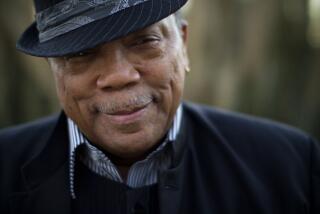‘Listen Up’: A Vivid Life of Quincy Jones
- Share via
Unquestionably, Quincy Jones is a logical subject for a documentary. Compared to his rise from trumpet player to composer, arranger, bandleader, record company executive, movie score composer, megahit record-maker, film producer and multimedia conglomerate, Horatio Alger’s heroes were underachievers.
“Listen Up: The Lives of Quincy Jones” attempts--in 111 minutes--to chronicle this saga, but even this is part of a multiple sales pitch: You’ve seen the movie, now buy the book; you’ve read the book, now purchase the soundtrack.
Directed by Ellen Weissbrod, “Listen Up” is rich in anecdotal nostalgia, heavy in its parade of celebrities, poignant in its examination of the pain, cost and humiliation of racism. Before he was able to climb up to the gold and platinum rungs on the ladder of success, establishing Michael Jackson on record as the first global black hero, Jones paid many dues. He was jailed at 14 simply for being black, thrown off the band bus at 16 by Mrs. Lionel Hampton because she thought he was too talented too soon, stranded in Europe at 27 for believing in an orchestra he led and refused to abandon, victim in the 1970s of two almost-fatal brain aneurysms.
It is a fascinating story with a million details, and this is the principal problem. The kaleidoscopic treatment involves not hundreds but perhaps a thousand fragments, most of them from one to 10 seconds long. The camera never rests; the viewer has no chance to breathe. Statements are abandoned in mid-sentence; songs are left unfinished.
Yes, we do see Ella Fitzgerald, Lionel Hampton, Clark Terry, Dizzy Gillespie, Ray Charles, Frank Sinatra, Sarah Vaughan, Miles Davis, Alex Haley, Jesse Jackson, Sidney Lumet and others, but most are on screen briefly before the continuity breaks off again.
Only a handful among the dozens of speakers voice more than a few passing thoughts: Clark Terry, who tells us Quincy was a great trumpeter; Billy Eckstine, who says he was a terrible trumpet player but has other amusing and cogent comments; and best of all, Jolie Jones, Quincy’s eldest daughter, whose honesty and eloquence almost steal the picture.
The three failed Jones marriages are dealt with very briefly, one in a short voice-over, two in on-camera flashes, but just as Quincy has said of his own father--”He was a real sad dude with women”--Jolie Jones sums it all up: “My father was a lady’s man.”
The chronology is erratic. We see Michael Jackson, a figure of the 1980s, before Lesley Gore, whose hit record produced by Jones was his first passport to fame--in 1963. We get a glimpse of Langston Hughes (where? when?), but he is not identified.
The memorable tour of the Middle East with a band Jones assembled for Dizzy Gillespie in 1956, which could have made an entire documentary in itself, is glossed over in 90 seconds. Only in a closing scene, where Jones was celebrating his 57th birthday last March, surrounded by children and grandchildren, is there a real sense of timing and relaxation.
The producer has seen fit to punctuate “Listen Up” with doggerel (a.k.a. rap) recited by Melle Mel, Flavor Flav and others, no doubt in an attempt to win the young audience. That this was done at the expense of more archival material, longer and more detailed examination of Jones’ career, is the film’s second-greatest flaw. It is an exact parallel to the 1989 Jones album “Back on the Block,” which attempted to give us too much of everything and offered not enough of anything.
Nevertheless, for its moments of truth and insight, “Listen Up” is a valuable document that deals, sometimes more wildly than wisely, with a most extraordinary life.
More to Read
Only good movies
Get the Indie Focus newsletter, Mark Olsen's weekly guide to the world of cinema.
You may occasionally receive promotional content from the Los Angeles Times.








